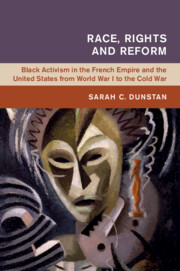 Race, Rights and Reform
Race, Rights and Reform Published online by Cambridge University Press: 01 March 2021
When Wall Street crashed in October 1929, it sparked an economic depression that shook the American people to the core. France fared little better: the full impact of the crash may not have been felt there until the end of 1932 but the Republic had already endured a decade of economic instability, due in part to the heavy burden of French war debts. As the decade wore on, commentators on both sides of the Atlantic worried that modern capitalism and the associated “liberal culture of modernity” was too frail to sustain democracy or the nation-state. This chapter focuses on the ways that African American and francophone black intellectuals responded to this so-called “crisis of modernity” during this period. Key black intellectuals and activists such as the Senegalese Léopold Sédar Senghor and the African American Mercer Cook sought to transform their respective national and imperial landscapes in order to reconfigure republican democracy along more egalitarian lines. Through journals such as L'Étudiant Noir, and the Crisis, as well as through a series of congresses and published anthologies these men and women made important theoretical and practical interventions into thinking around citizenship, national sovereignty and access to rights.
To save this book to your Kindle, first ensure [email protected] is added to your Approved Personal Document E-mail List under your Personal Document Settings on the Manage Your Content and Devices page of your Amazon account. Then enter the ‘name’ part of your Kindle email address below. Find out more about saving to your Kindle.
Note you can select to save to either the @free.kindle.com or @kindle.com variations. ‘@free.kindle.com’ emails are free but can only be saved to your device when it is connected to wi-fi. ‘@kindle.com’ emails can be delivered even when you are not connected to wi-fi, but note that service fees apply.
Find out more about the Kindle Personal Document Service.
To save content items to your account, please confirm that you agree to abide by our usage policies. If this is the first time you use this feature, you will be asked to authorise Cambridge Core to connect with your account. Find out more about saving content to Dropbox.
To save content items to your account, please confirm that you agree to abide by our usage policies. If this is the first time you use this feature, you will be asked to authorise Cambridge Core to connect with your account. Find out more about saving content to Google Drive.